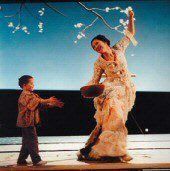I don't understand the argument that opera is not inclusive. Here's Scottish Opera flogging £10 tickets to under-26s - any seat in the house as well - meanwhile black market passes for Rockness are changing hands at multiple hundreds a go.
It seems however, judging by the buzz on opening night, Scottish Opera have done a pretty good job of spreading the word. Add that to a plethora of educational activities on offer, such as their 'unwrapped' behind the scenes series and school tours and there is a glimmer of hope for the de-mystification of this lofty and challenging genre. And if there was any opera guaranteed to convert the most hard-nosed cynic, it would surely be Puccini's petite fiery gem, Madama Butterfly. The story of naïve but feisty Butterfly, a geisha with social aspirations, and her doomed love to flippant American Lieutenant Pinkerton whips up a frenzy of passion and tragedy in an opera-phobic-friendly two hours 50 minutes, as well as dealing with the issues of teenage pregnancy, single motherhood and the USA's influence on other parts of the world.
Written in 1904, it's first airing was less than lukewarm, but nevertheless it has gone on to bear some of the world's most well-hummed arias, often moonlighting as an unwitting supplier of Sunday afternoon Classic FM fodder.
With this in mind, Scottish Opera's production is a little surprising in its understated simplicity. Yannis Thavoris's set is a skew-wif rhombus of a Japanese house with exaggerated angles and sliding screens. Most of the stage is blacked off for the action to take place within the box, save for a single cherry blossom branch reaching onto the stage like a wizened old hand. Muted colours and sensual lighting provide the backdrop, with costumes a mixture of western Edwardian bustles and suits, and traditional Japanese kimonos, the resulting effect being that of a miniature painting brought to life.
This allowed the music to take centre stage, and whilst the orchestra had a slight timidity to its opening, they came right out of their shell as the score swept into its first lyrical passage. Conductor Francesco Corti was keenly alert to the balance between musicians and singers, especially in leader Anthony Moffat's spine-tingling solos, and the mingling voices of Rebecca Nash and John Hudson on the fated wedding night.
There was a quiet chemistry to the whole ensemble, but the weight of this opera inevitably rests on its title role, and Rebecca Nash demonstrated all the makings of a true grand dame. With gravitas and sensitivity, she cascaded around the top of her range combining Butterfly's teenage petulance with the powerful sorrow of a spurned lover.
In one of the few theatrical indulgences of designer Thavoris, a final backdrop of the red and white stripes of the American flag is unveiled as Butterfly looms towards her death, and seems ominously relevant as a reminder of the West's current penchant for sneaking into foreign lands and leaving a wake of destruction.
Frugal and egalitarian, this was the kind of beautifully sincere production which anyone could aspire to put on, but not necessarily pull off with Scottish Opera's sophistication and subtlety.
